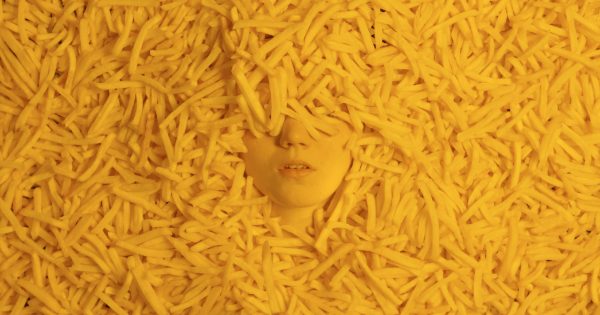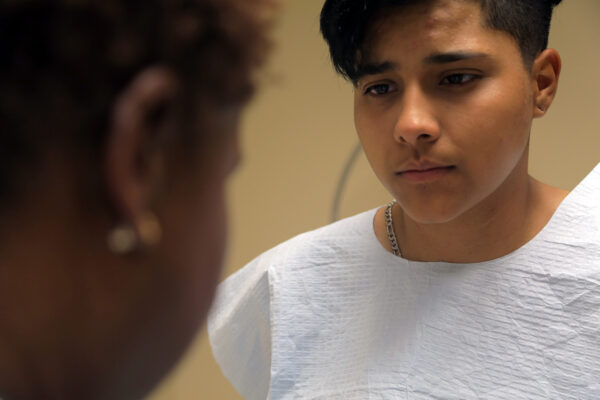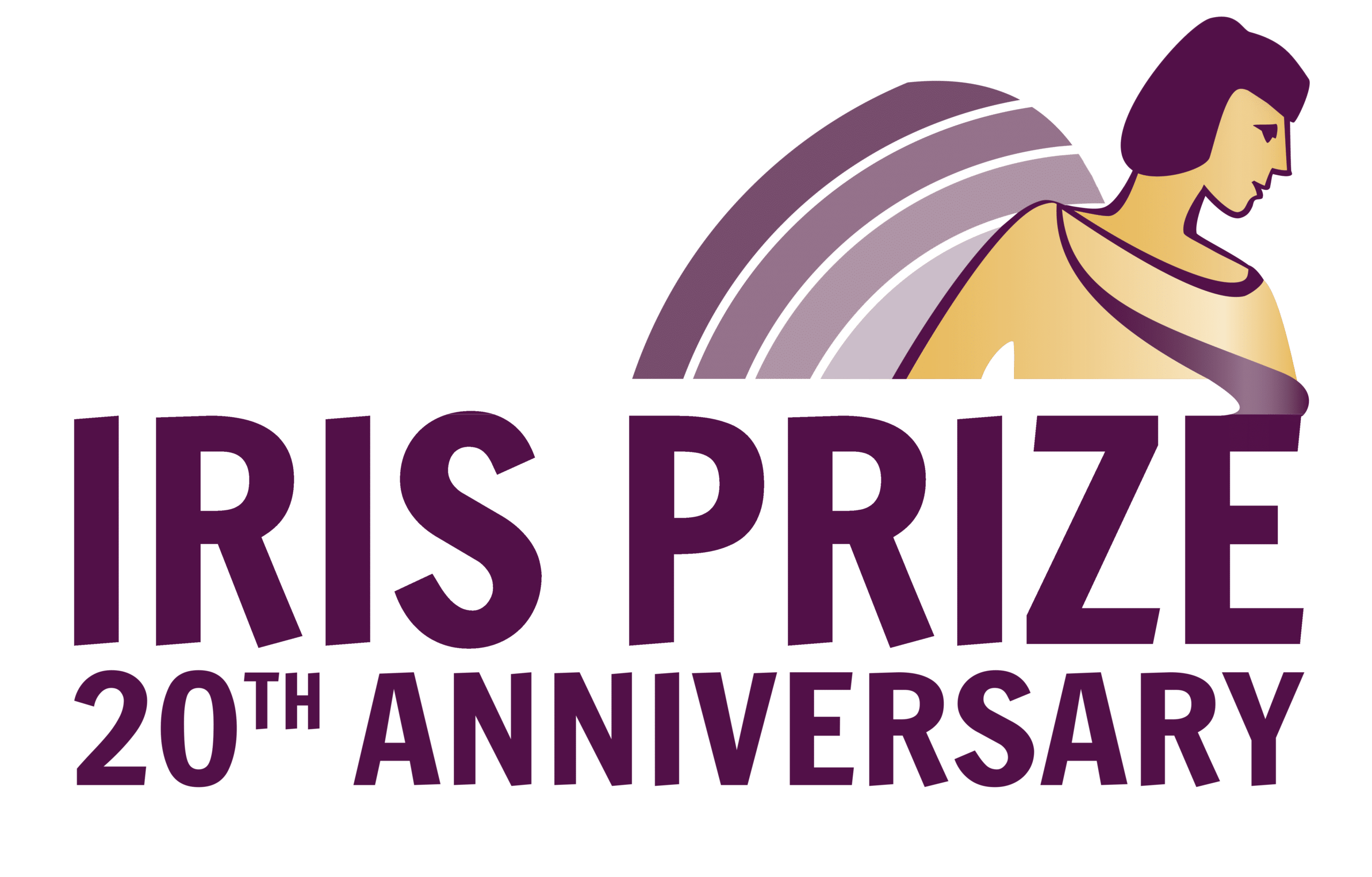DAY 4 IRIS REVIEWS: TASTE OF LOVE, OUTLINES AND GET THE LIFE
Suri Mukherjee reviews some of the films screened in the 4th day of the festival.
Friday was a blur. If not for the festival programme, I couldn't tell you which films I did and did not see. I spent the whole day in Cineworld and at night I had a whole lot of drinks at Pulse.
(This is known as a "baptism" in Team Iris - Ed.) But now that I can think clearly again, let's talk about the films!
The range of diverse perspectives shown during this festival has been astounding. I could deeply relate to the characters represented on screen numerous times - and I really can't say that about most of the films I've seen elsewhere. The organisers deserve all the rounds of applause they get. So, for today's Iris Reviews, I picked films which stray from the conventional narratives we usually see. Tuck in!
 Taste of Love
Taste of Love
This short takes us through the sexual journey of the protagonist by using food. I expected it to be an average experience but director Paul Scheufler blew my mind. He expertly choreographs the visuals on screen to correspond to the words. And what we have as a result is cinematic poetry. It is a gorgeous film and I have never found fruits and chips to be as beautiful as I do now. He is not afraid of close-ups and he is definitely not afraid of colours. He uses unconventional techniques to tell us a whole story, and you will listen. It is impossible to look away or lose focus for the duration of this short. I will not waste any more words on this film because it is something that needs to be experienced with your eyes.
 Outlines
Outlines
Introducing the short, writer-director Ellie Rogers said that she just wanted to make a film about a female relationship that doesn't involve romance or sex, and 'Outlines' is exactly that. The protagonist Sarah comes home to find a hired escort who has just slept with her father, and through the evening the two develop an unlikely friendship.
It begins with absolute distrust between the two and progresses smoothly into a bond of trust and support. Implausible as the plot sounds, Rogers does a great job at making it believable. At the end, it was heart-breaking to see the two forced apart. You get so immersed in the little world of these two women talking that you forget they are not supposed to be talking at all. You want them to reunite and their sweet, unique friendship to persevere. I have to take my hat off to Rogers' imagination for coming up with something like this and her expertise for executing it skilfully.
 Get The Life
Get The Life
This short tells a unique story which urgently needed to be told. Alex is a trans man who has immigrated to the US to "get the life" he wants. In this short, he gets pregnant and consequently seeks an abortion. In a short time, this story shines a light on several important issues. It explores the fluid sexual dynamics within a queer relationship, along with Alex's experience of dysphoria. It makes a crucial point about how transgender men are left out of the conversation on abortions and the differing reasons they might seek one. It subtly shows how even well-meaning people can misgender them.
In the beginning, it seems like Alex's boyfriend is perfectly understanding and loving. But that changes in the blink of an eye. As soon as he suspects Alex of cheating, he calls him a racial slur. And then you discover that he hasn't been respectful in terms of their method of protection during sex. It was deeply disturbing to watch but these aspects of relationships need to be portrayed. Because they reflect reality.
'Get The Life' stood out to me because of its contrast with
'Sununú: A Revolution of Love'. The latter is a documentary about an Ecuadorian transgender couple, Fernando and Diane, and it screened in the festival on Thursday. Unlike Alex, Fernando was happy to be pregnant and he didn't feel like less of a man as a result. So, in the space of two days, we've seen two very different approaches to the subject of trans men and pregnancy, and that is the plurality of narratives we need to see in the mainstream media. At present, you'd be hard-pressed to find one film about a trans man at any given time. At the Iris Prize film festival, you have several different stories coming from very different angles. That's the range of diversity I mentioned earlier. Only at Iris!
 Taste of Love
This short takes us through the sexual journey of the protagonist by using food. I expected it to be an average experience but director Paul Scheufler blew my mind. He expertly choreographs the visuals on screen to correspond to the words. And what we have as a result is cinematic poetry. It is a gorgeous film and I have never found fruits and chips to be as beautiful as I do now. He is not afraid of close-ups and he is definitely not afraid of colours. He uses unconventional techniques to tell us a whole story, and you will listen. It is impossible to look away or lose focus for the duration of this short. I will not waste any more words on this film because it is something that needs to be experienced with your eyes.
Taste of Love
This short takes us through the sexual journey of the protagonist by using food. I expected it to be an average experience but director Paul Scheufler blew my mind. He expertly choreographs the visuals on screen to correspond to the words. And what we have as a result is cinematic poetry. It is a gorgeous film and I have never found fruits and chips to be as beautiful as I do now. He is not afraid of close-ups and he is definitely not afraid of colours. He uses unconventional techniques to tell us a whole story, and you will listen. It is impossible to look away or lose focus for the duration of this short. I will not waste any more words on this film because it is something that needs to be experienced with your eyes.
 Outlines
Introducing the short, writer-director Ellie Rogers said that she just wanted to make a film about a female relationship that doesn't involve romance or sex, and 'Outlines' is exactly that. The protagonist Sarah comes home to find a hired escort who has just slept with her father, and through the evening the two develop an unlikely friendship.
It begins with absolute distrust between the two and progresses smoothly into a bond of trust and support. Implausible as the plot sounds, Rogers does a great job at making it believable. At the end, it was heart-breaking to see the two forced apart. You get so immersed in the little world of these two women talking that you forget they are not supposed to be talking at all. You want them to reunite and their sweet, unique friendship to persevere. I have to take my hat off to Rogers' imagination for coming up with something like this and her expertise for executing it skilfully.
Outlines
Introducing the short, writer-director Ellie Rogers said that she just wanted to make a film about a female relationship that doesn't involve romance or sex, and 'Outlines' is exactly that. The protagonist Sarah comes home to find a hired escort who has just slept with her father, and through the evening the two develop an unlikely friendship.
It begins with absolute distrust between the two and progresses smoothly into a bond of trust and support. Implausible as the plot sounds, Rogers does a great job at making it believable. At the end, it was heart-breaking to see the two forced apart. You get so immersed in the little world of these two women talking that you forget they are not supposed to be talking at all. You want them to reunite and their sweet, unique friendship to persevere. I have to take my hat off to Rogers' imagination for coming up with something like this and her expertise for executing it skilfully.
 Get The Life
This short tells a unique story which urgently needed to be told. Alex is a trans man who has immigrated to the US to "get the life" he wants. In this short, he gets pregnant and consequently seeks an abortion. In a short time, this story shines a light on several important issues. It explores the fluid sexual dynamics within a queer relationship, along with Alex's experience of dysphoria. It makes a crucial point about how transgender men are left out of the conversation on abortions and the differing reasons they might seek one. It subtly shows how even well-meaning people can misgender them.
In the beginning, it seems like Alex's boyfriend is perfectly understanding and loving. But that changes in the blink of an eye. As soon as he suspects Alex of cheating, he calls him a racial slur. And then you discover that he hasn't been respectful in terms of their method of protection during sex. It was deeply disturbing to watch but these aspects of relationships need to be portrayed. Because they reflect reality.
'Get The Life' stood out to me because of its contrast with 'Sununú: A Revolution of Love'. The latter is a documentary about an Ecuadorian transgender couple, Fernando and Diane, and it screened in the festival on Thursday. Unlike Alex, Fernando was happy to be pregnant and he didn't feel like less of a man as a result. So, in the space of two days, we've seen two very different approaches to the subject of trans men and pregnancy, and that is the plurality of narratives we need to see in the mainstream media. At present, you'd be hard-pressed to find one film about a trans man at any given time. At the Iris Prize film festival, you have several different stories coming from very different angles. That's the range of diversity I mentioned earlier. Only at Iris!
Get The Life
This short tells a unique story which urgently needed to be told. Alex is a trans man who has immigrated to the US to "get the life" he wants. In this short, he gets pregnant and consequently seeks an abortion. In a short time, this story shines a light on several important issues. It explores the fluid sexual dynamics within a queer relationship, along with Alex's experience of dysphoria. It makes a crucial point about how transgender men are left out of the conversation on abortions and the differing reasons they might seek one. It subtly shows how even well-meaning people can misgender them.
In the beginning, it seems like Alex's boyfriend is perfectly understanding and loving. But that changes in the blink of an eye. As soon as he suspects Alex of cheating, he calls him a racial slur. And then you discover that he hasn't been respectful in terms of their method of protection during sex. It was deeply disturbing to watch but these aspects of relationships need to be portrayed. Because they reflect reality.
'Get The Life' stood out to me because of its contrast with 'Sununú: A Revolution of Love'. The latter is a documentary about an Ecuadorian transgender couple, Fernando and Diane, and it screened in the festival on Thursday. Unlike Alex, Fernando was happy to be pregnant and he didn't feel like less of a man as a result. So, in the space of two days, we've seen two very different approaches to the subject of trans men and pregnancy, and that is the plurality of narratives we need to see in the mainstream media. At present, you'd be hard-pressed to find one film about a trans man at any given time. At the Iris Prize film festival, you have several different stories coming from very different angles. That's the range of diversity I mentioned earlier. Only at Iris! 
